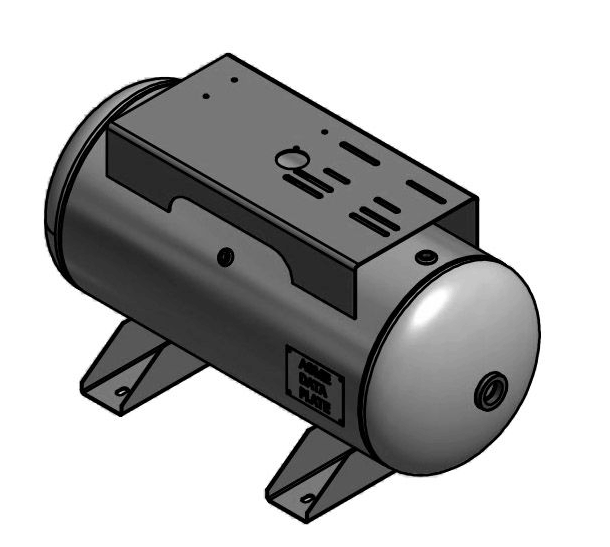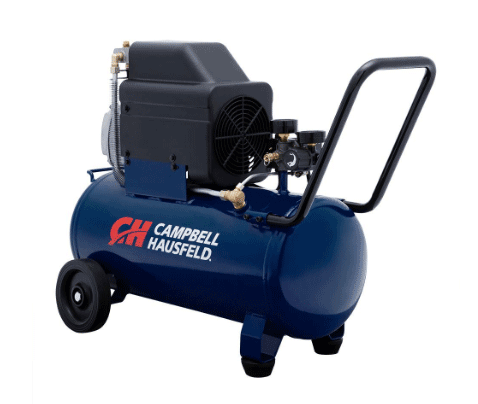One question that pops up on this website all the time relates to helping folks when they are picking a compressor. What are the things you need to consider? What do you want to know when you, or someone buying a gift for you, is picking an air compressor?
The choice might be a Husky, a Kobalt, a Speedaire, a DeWalt air compressor… or one of the dozens and dozens of other compressors. There are more compressors out there for the DIY than there have ever been before.

Table of Contents
Choosing an Air Compressor
What is the Compressor For?
Give some thought as to what you expect the air compressor to be used for or be able to do for the person you gift it to.
Using a compressor once in a while to blow the dust off a piece of the woodwork will point to one type of compressor. A compressor necessary to run high-demand air tools like grinders, saws, ratchets, spray guns, and wrenches will point to a different sort.
Take a moment to think your compressor needs through, jot them down even, and read on, for more help.
Where Will the Compressor Be Used?
Is the air compressor location going to be important? Compressor location is important to a business that will have a fixed installation of a fairly large air compressor. If you are picking a compressor for your work, this page is worth reading.
The compressor location is not as important for folks buying a home, or small workshop, do it yourself type air compressor. Many of these types of air compressors are portable and can be relocated when necessary.
What Power Supply Does Compressor Need?
When you power your air compressor with a typical household circuit, in North America at least, you are supplying 120 Volt AC power, typically through a 15-20 amp circuit breaker or fuse.
The page about air compressor power requirements on this site will help you understand why you cannot run larger air compressors from a typical household current.
You may have to go to a 220 Volt or larger power supply if your air needs are large enough. Can you do this if necessary for the compressed air flow you want? Does the added expense suit your budget?
Tool Compressed Air Demand
When picking a compressor I cannot stress strongly enough the need to find out before you buy, particularly if it will be a regularly used compressor, what your tool selection needs are in terms of air pressure (PSI), and compressed airflow (CFM). Not having a reasonable idea of these numbers may lead to the acquisition of the wrong sized compressor.
If your air tool needs more compressed air to run than your air compressor can deliver, you will be disappointed and may not be able to do the work you wished to do. This is much more important for a business than a DIY’er, but nevertheless, no one wants to buy a tool that will not work for them, and an air compressor that’s too-small fits into that category.
This is useful information, particularly if you are planning on buying an air compressor for someone else and need some help making a decision about the many types of home and small workshop air compressors out there.
Compressor Tank Size
When you go in the store looking for your ideal air compressor, you will see quite a variety of them, in all shapes, colors, and sizes.
One thing you will see is that there are quite a variety of tank shapes and sizes. Typically, you will see…
- longer tank on its side, sometimes with wheels
- a pancake shaped tank
- compressors with multiple cylindrical tanks
- vertically oriented tanks with the compressor on top
I wrote an article comparing these “foodie” shaped compressors – pancake vs hotdog air compressor tanks – it’s worth a read if you’re not sure what the difference is!

Other Considerations
What else would you like to know in advance when you set off to the store for the purpose of picking your air compressor?
Any Compressor Warranty?
What is the warranty of the air compressor you are interested in buying, and what are the steps to be taken when and if you have a warranty repair? You want to find out the store’s policy on compressor warranty because your compressor is going to fail one day.
Does the store just replace the compressor if it fails under warranty, or do they get them fixed?
If they get fixed, where does the compressor get fixed? Do you deliver or do they pick up, an issue for the larger compressor for sure. They are heavy!
When your air compressor warranty expires, who will fix it then? Can the store provide a reference? Ask the warranty repair depot if they will continue long-term service.
Compressor Parts Available
There are hundreds of models and dozens of makes of air compressors on the market. The task of keeping parts for all these compressors is gigantic.
Does the store stock parts for that model of compressor? The answer to that question will almost invariably be no.
If not, then where will you go to get parts for that brand of air compressor next year, the year after, and maybe five years after they stop selling that particular model? Or, is compressor repair even an issue for you? The time and aggravation involved with getting parts and trying to fix a $100 compressor may not be worth it to you. Your call!
Haste Makes… A Useless Compressor
There are many things to consider when selecting an air compressor.
Give the process a bit of thought, will you? A mistake in purchasing the wrong air compressor can be easily made leaving you or the compressor recipient with, essentially, an expensive boat anchor.
More information and questions about choosing an air compressor:
What size air compressor for spray painting?
What size air compressor for an impact wrench?
What size air compressor for a double acting sander?
What size air compressor for an air stapler?
What size air compressor for sandblasting?
What size air compressor for spray texturing?
What size air compressor for car detailing?
CFM – SCFM compressor flow issues
Increasing compressor pressure and CFM
Inflate a stand up paddle board
Compressor and propane tanks to aerate a pond
Buying Air Compressors
Buying an air compressor is complex. I’d like to simplify the process for you by providing some information that I hope is useful as you hunt down the perfect air compressor for your needs. This page addresses much of what you need to know to help you when selecting and then buying your air compressor, whether it be for a shop or home workshop use.
The following list will guide you to gather information from the various compressor manufacturers, to help you decide which company, which type of air compressor, or which feature(s) provides you the best value for your compressor needs.

Compressed Air Requirements
If you haven’t yet determined what your total CFM requirements are, and at what pressure you need that compressed air delivered, you can’t be expected to select a compressor that suits you. You really must do this first.
Please see these links for further information about sizing an air compressor, and if you are looking for an air compressor to run air cylinders, information on how to select a compressor that is suitable.
Remember, when you’re sizing your air compressor, that typically 1 HP of air compressor motor size generates 3-4 CFM of compressed air at about 90 PSI from the compressor pump.
This is the accepted wisdom for air compressors over 10 HP in size. For smaller compressors, those under 10 HP, you must rely on the figures provided by the manufacturer or “guestimate” that you’re getting around 2-3CFM of compressed air per HP @ 90 PSI.
Compressed Air Losses
Remember too that, over time in a typical plant environment, you can expect to lose about 10% of your overall air production through compressed air misuse or compressed air leaks, and through pressure drops in the system.
You do want to allow for this.
Where are we planning to be in 5 years regarding compressed air-related demand? Allow for expected growth.
Continuous Run or Start & Stop Compressor?
Whether your compressor should be a continuous run style or one that starts and stops based on the pressure cycle, may be answered by your demand requirements. If it isn’t clear cut, talk to the manufacturers about their benefits for a compressor that fills a reservoir and stops until low pressure signals a start, or one that runs continuously, but only compresses air as the demand is there.
Field portable units, which often run on gasoline or diesel, are usually continuously run, as the need to start and stop a fossil fuel motor every few minutes is negative to the motor.
Portable or Fixed Installation?
Are you planning to take it with you to various locations or job sites, or is this air compressor heading for a fixed installation?
While most plants rely on fixed installations, there will be many applications for portable air compressors too. If that’s your choice, you need to discuss with the vendors the methods of portability; is the air compressor carried, come already installed on a wheelbarrow or cart, is the compressor itself wheeled, trailer type, etc.? You discuss this with the compressor sales outlet based on your expected needs.
Available Power Supply?
Regardless of the type of compressor you purchase, it will have to have a power supply. If it’s to be installed in a plant, what voltages or amperages do you have available? To get the volume of air you need, will you have to upgrade your electrical system?
Since the amount of power available in a typical home 120 VAC circuit limits the size and therefore the volume of air from the compressor, if you are planning on running high-demand air tools or multiple tool locations, you will want to look at 220 VAC systems.
If it’s a portable style of compressor, do you want it powered by gasoline, diesel, or perhaps propane? Are there any other power options available or necessary for you, depending on where you are in the world?
Operating Costs?
Your compressed air supply and pressure requirements will drive you to select compressor manufacturers that actually make the air compressors with the capacity and flow that you require.
Then, the available power supply may further narrow the list of vendors to those that can provide a unit that runs on the power you have available or that you choose to use.
Regarding electrically driven compressors, higher voltage units can sometimes generate compressed air at a lower cost. Ask about the voltages available from that vendor, and your benefit as it pertains to lower operating costs depending on that voltage.
Perhaps you might find that a propane unit offers lower operating costs than gasoline if you need a portable unit.
To figure out the running cost of prospective compressors there is another page of information about how to figure that out on this site. Costs to operate an air compressor. Don’t skip this page as the cost to operate may be the one metric that helps you decide one brand over another.
Over the life of the air compressor, the operational energy and maintenance costs will outweigh the initial capital cost of the air compressor by a wide margin.
What Comes With The Air Compressor?
One manufacturer has a list of included features that another shows as extra-cost accessories.
What comes included with each compressor? This is a useful way to compare “apples to apples” from various compressors and manufacturers.
Maintenance Required For This Make & Model of Compressor?
What is required regarding maintenance for each compressor you are looking at? What are the mean times between maintenance functions; what are the costs of the various consumables each compressor may require, for regular and long-term maintenance?
For example, if the air compressor is oil lubed, how often between oil changes, and what is the type of oil recommended? Some manufacturers recommend synthetic oils which come at a higher cost. If so, what are the benefits you can expect for that greater expense?
Compressor Life Expectancy
How long will this particular model last when used for normal operating periods.
If you’ve considered under-sizing your air compressor to save some capital expense upfront, and end up pushing it past its acceptable duty cycle, how will that affect its life expectancy? Will you be buying another compressor much sooner than expected?
Compressor Warranty
Not all warranties or guarantees are made equal. To get your business, some manufacturers may improve on their warranty. If that is the case, make sure you get any such promises in writing.
You might save a lot of money on a compressor that offers a poor warranty, yet you might find yourself replacing it completely, long before a more expensive unit, backed by a secure warranty, would have been used up.
Who Fixes This Brand of Compressor?
Do you have someone in your shop that’s capable of fixing your air compressor when the warranty expires?
If not, who will fix the air compressor then? Where are their offices, what’s the response time, are there travel expenses, and how much will it cost for a service call?
Parts Cost
You want a company that has a good warranty, and backs it up with in-plant service, but what about the cost of the parts?
Once you know who will fix your compressor, ask for a parts breakdown, determine from the vendor which parts are likely to fail, and ask what the purchase price is for those parts.
There will be significant pricing disparities for similar parts from different vendors. Take the time to check as parts cost could be a large part of your compressor operating budget as time goes on.
Capital cost
How much does it cost to purchase each type of compressor you’ve narrowed your list down to?
Some might quote delivered your plant, others not, so add delivery/installation costs to the capital cost of each if the price quoted doesn’t include that, so that all vendor’s prices are quoted the same.
Financing
Are there any creative financing options available from the various compressor firms to help entice you to purchase from them?
Some may “carry the paper” of the loan, and if they will, and you decide not to take that benefit, perhaps refusing it might lower the cost of the unit somewhat?
Did you know that…
“Air tools … deliver more torque and higher revolutions-per-minute than electric tools, helping you complete your jobs more quickly and effectively.”
FAQs (Frequently Asked Questions)
To choose an air compressor you typically need to think about what you intend to use it for and where you intend to use it. The tools you wish to power can help you decide how much CFM you need, and where you wish to place it can help you understand how much room you have available for the compressor and its tank.
This totally depends on the tools you want to operate. You must understand the CFM ratings of each and every tool, and size the air compressor based on these values. People tend to estimate that you should add up the CFM requirement of all your tools and multiple the total by 1.5 to give you the absolute minimum CFM rating of your compressor.
If you have any questions regarding choosing or buying an air compressor, please leave a comment below, with a photo if applicable, so that someone can help you!
